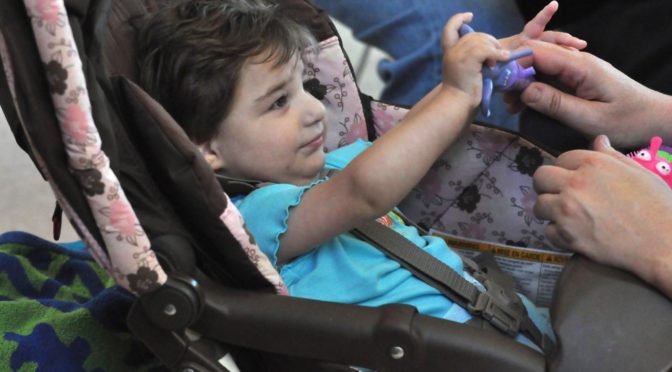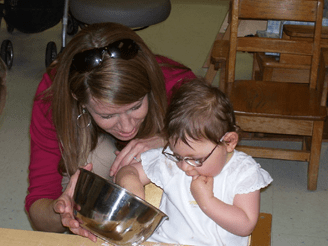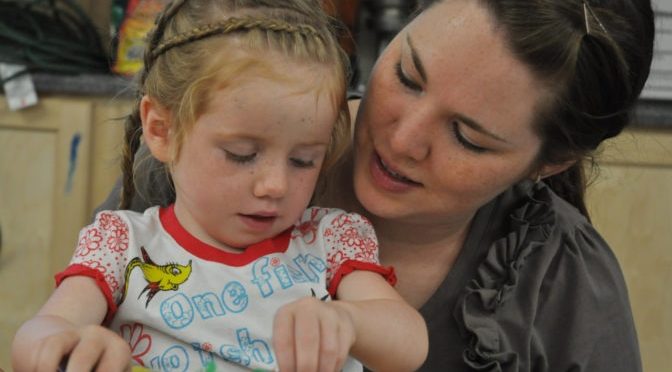Back in August, we announced the launch of our early childhood intervention service called LightHouse Little Learners. LightHouse Little Learners will give us the opportunity to provide specialist services and bring our brand of blindness-positive philosophy to families with children ages birth to three who are blind, DeafBlind, have low vision or neurological visual impairment, or whose developmental delays include blindness or low vision throughout Northern California.
Since our launch we’ve been searching high and low for the right person to lead this new arm of LightHouse services, and we are thrilled to announce that we have found her. Pam Chapin has joined us as LightHouse Little Learners Program Director. She has a wealth of experience in this area and has hit the ground running. In the below interview she tells us how she became interested in early intervention, why she loves it and describes the reality of what families can face in these early, crucially important stages of their child’s life. Welcome to the LightHouse, Pam!
Early Childhood Intervention for children who are blind or have low vision is a very specific discipline, how did you become interested in this area?
I was working as a Child Development Specialist for Santa Clara County Office of Education, supporting inclusion services within the Head Start preschool system. I was contacted by a TVI [Teacher of the Visually Impaired] who was looking for a full-day preschool placement for one of her students whose working mom needed care for her daughter [Bianca] who was blind. At that time, the Head Start program had a half-day classroom that was blended with this TVI’s classroom. It was a great program but would not have provided care during the hours the family needed. My role was to determine what supports would help the child, teacher and classroom have a successful experience. I visited little Bianca in her vision program to meet her. She was playing in a huge motor room, exploring the entire space, climbing play structures, bouncing balls, and scooting on ride-on toys. Clearly, Bianca was unstoppable! I knew she would be successful in the preschool classroom. We met with her parent, followed her TVI’s recommendations, invited her [Orientation & Mobility] specialist to visit the classroom, and supported the Head Start teacher as we all learned together alongside Bianca. She was part of the classroom community, just like every other child, and she opened doors for other children who would come after her. After this experience, I went to work for the Blind Babies Foundation and eventually completed my TVI credential and MA in special education at [San Francisco State University].
How close is it to the kind of thing you thought you might like to do growing up?
I used to pretend I was a teacher when I was a child and remember trying to teach a neighborhood boy how to read while I was still learning myself. I initially studied psychology and planned to become a child psychologist or family therapist, but I often found myself working in different areas of early childhood or special education. I worked with a variety of age groups and in different settings, including a Montessori preschool, a classroom for students with learning disabilities, a home-based autism program, and a vocational program for adults with intellectual disabilities. Once I began working at Blind Babies Foundation, I fell in love with the community, the children and families and wanted to continue learning. I love the blending of early childhood education, infant-family mental health, blindness education and inclusion.
Give us a quick run-down of your career in this area so far?
During my tenure with Blind Babies Foundation, I also served as Regional Coordinator, Assistant Program Director and Program Director. My education in the field has come from many teachers, mentors, colleagues, and especially the children and families who have shared their journeys with me. I have been so fortunate to work with many exceptional mentors and to participate in research projects at Smith-Kettlewell Research Institute. We have learned a tremendous amount from our pediatric ophthalmology partners to better understand childhood vision diagnoses that may impact early learning. Babies and families motivate my learning, as well as educating the community about the importance of early learning experiences and family support. I am passionate about helping families access quality services for their child who is blind, has low vision, neurological visual impairment or complex needs.
Over the seventeen years you’ve been working with children who are blind or have low vision, what are some of the developments you’ve seen in the practice over that time?
One of the shifts I have experienced is a movement away from a therapy model to a family centered coaching model. In a therapy model, the teacher arrives in the home with a toy bag and engages the child in activities, modeling for the parent and teaching them strategies to implement with their child throughout the day. The coaching model aligns with what we often call the Infant Mental Health model, in which the focus is on the relationship between the infant and parent, or caregivers, because we all learn through important relationships. Our role is to help parents understand their infant’s cues, which may be different than a sighted child. We observe together to learn how their child is using all of their senses to learn, explore, play and communicate, and to help parents integrate learning opportunities into their daily routines. We help families create experiences that are accessible to their child, and sometimes to increase their child’s ability to use their vision by adapting the environment or materials. As parents understand their child’s unique learning needs, they become very skilled at making concepts and activities accessible for their child, and confident in explaining these needs to others, setting the stage for their child’s future self-determination.
The other significant development is the advancement of the neuroscience, research and understanding of neurological or cerebral visual impairment (CVI). I recall an analogy when I started in the field that described CVI as “like looking through Swiss cheese.” We are now learning just how complex the visual brain is and how interconnected with the rest of the brain. CVI is the most common cause of childhood visual impairment in the US, so it is essential that we understand how varied the impact of CVI is on each individual, from difficulties perceiving movement or specific visual fields, to challenges locating or identifying objects, or navigating a room. This increased understanding has helped us more accurately observe how an infant or young child is accessing visual information and integrating that with other sensory information to learn. The more we understand, the more successfully we can individualize a child’s play and learning experiences to make them meaningful and engaging.
Can you give an example of a family or child who is blind or has low vision, who helped you learn and grow in your teaching?
One of the first parents I met when I began working with families had a son who had cerebral visual impairment and cerebral palsy. She was a mentor in the truest sense of the word and showed me what was possible at home, school and in the community. She would set up an experience of roller skating for her child who was blind and used a mobility chair by positioning him in an Active Learning Hopsa Dress that supported his body in an upright position while allowing movement, placing roller skates on his feet, and positioning him over different surfaces where he could hear the sounds of the wheels, feel the vibrations in his feet and body, and just belly laugh! She ran a neighborhood summer camp experience for local children. She advocated in school for her child to have access to learning materials, instructional methods, qualified teachers and peer groups that he needed to thrive. And I will always remember her presenting to a room full of educators, researchers, and physicians that the most important thing to her was that her child was free from pain, that this must come first before any other agenda. He was a child first, a whole person, and this must guide everything we do.
What’s the most difficult aspect of working with this population?
The greatest frustration is access. At a time when families are at their most vulnerable, they face a mountain of hurdles as they try to navigate medical and educational systems. Bringing a new child into your family is a beautiful and joyful time, and it is also a bit scary because you don’t yet know this little person and how best to care for them. Now imagine suddenly having to navigate multiple medical specialists, diagnoses, insurance battles, perhaps medications or a feeding tube, lack of childcare to return to work and the economic impact of that on your family. Then there may be barriers to receiving early intervention services to help your child, long waits before services begin, language barriers, or challenges understanding the array of services you are entitled to access. Families often have multiple appointments each day with doctors, therapists, specialists, teachers and early interventionists. It can be stressful, daunting, and often a fulltime job for a parent to navigate these systems. The experience of accessing help should be coordinated, integrated and welcoming.
What are you most excited about building a program like this from the ground up?
Starting from the ground up is so exciting because we can dream of new possibilities. We have the opportunity to design creative service models, to ask what families need, build community, and to reach out to underserved regions. I am excited to bring families into the LightHouse community where they will have access to innovative programming as their child grows, meet mentors, and share meaningful experiences such as attending camp. Little Learners will be part of a much larger mission to create access, opportunity, and connection from infancy through adulthood.




